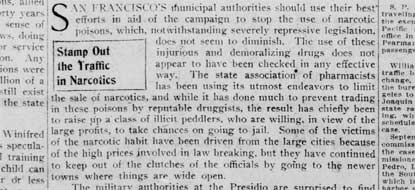Drug WarRant reader Chris found something interesting on the editorial page of a San Franciso newspaper from August 30, 1910 (full page available here as a pdf).
The paper was urging the municipal authorities to use their best efforts to “stop the use of narcotic poisons.” Their description of the problem in the editorial is fascinating:
San Francisco’s municipal authorities should use their best efforts in aid of the campaign to stop the use of narcotic poisons, which, notwithstanding severely repressive legislation, does not seem to diminish.
Lesson #1: Even “severely repressive legislation” has no impact on drug use.
The use of these injurious and demoralizing drugs does not appear to have been checked in any effective way.
Lesson #1 is re-stated.
The state association of pharmacists has been using its utmost endeavors to limit the sale of narcotics, and while it has done much to prevent trading in these poisons by reputable druggists, the result has chiefly been to raise up a class of illicit peddlers, who are willing, in view of the large profits, to take chances on going to jail.
Lesson #2: Prohibition results in a very lucrative black market which encourages people to turn to criminal activity.
Some of the victims of the narcotic habit have been driven from the large cities because of the high prices involved in law breaking, but they have continued to keep out of the clutches of the officials by going to the newer towns where things are wide open.
Lesson #3: When prohibition tries to clamp down in one area, it just pops up in another.
The military authorities at the Presidio are surprised to find the drug habit spreading among the garrison….
Lesson #4: No place is so secure that it can prevent supply from meeting demand.
Now, perhaps we shouldn’t be too hasty to fault the editors of the San Francisco Call in August of 1910 for being unable to read the clear lessons in their own words and still suggesting a continuation of prohibition efforts. Perhaps they had limited historical background upon which to gauge the effectiveness of their suggestions.
But what’s the excuse of the media 99 years later?



This isn’t on the topic of this particular thread, but I just read a story about kidnapping in Mexico, and how it has become one of the worst kidnapping countries in the world. That story agitated me so much I decided I to post about it right away.
The reason kidnapping is so prevalent, of course, is the lawlessness rampant in Mexico as a result of the drug war.
Kidnapping is in the top 5 or 6 worst possible crimes, and it is hard to fight against if the idea gets around that you can get away with it. Since everyone now knows you can literally get away with murder in Mexico these days, kidnapping is a given.
This must stop, urgently so. The drug war is causing a catastrophe in Mexico, and we have just got to pull the plug somehow.
To comment on the current thread, yes, history does seem to repeat itself, over and over and over. Been more than 100 years now.
One of the things that surprised me when reading Mark Thornton’s book “The Economics of Prohibition” was the prevalence of State intervention in the early 1800’s.
Thornton argues that these interventions – on opium, alkohol, saloons – did in fact create additional problems, and that these problems in turn was harnessed by prohibitionists as an argument for even further intervention. Much like when contemporary politicians point to “increased drug related crimes” and “increased deaths” as an argument for more prohibition.
I’m not sure how well-known that was at the time, but I’m fairly certain the nature of man wasn’t all that different.
In engineering, one of the greatest problems with any system is regulation. There has to be feedback in order to control the system. But if there’s no feedback that isn’t distorted, the system goes crazy and destroys itself.
The DrugWar has been a system that has been allowed to go on without much in the way of proper regulatory feedback for a very long time. Instead of the ‘negative’ feedback required (like brakes on your car when you’re going too fast) , ‘positive’ feedback (hitting the gas when brakes are needed) is applied. And so, with every failure, the demand to apply further ‘positive’ feedback increases…and we see the result all around us. All to placate a small minority of people in this country who directly benefit from this fiscal and social trainwreck…that has gone off the tracks and is about to crush those who’ve footed the bill for its’ fuel and maintenance.
A society that refuses to learn from History’s lessons will be doomed to repeat them. At least, until the lessons become too expensive. As they have.
Truly, there is nothing new under the sun.
The message about feedback regulation applies to biologic systems as well. And we biologic systems created the failed policy and the law which controls policy possibilities. The fundamentally unequal regulation of alcohol, tobacco and other drugs that alter mental function has failed. We, yes we the people, have stuck the law in an ideologic loop! We need to get out from under article 4(c) of the 1961 UN Single Convention! That principle blinds us by ensconcing a western biomedical paradigm as the definition of ‘proper’ use of drugs that alter mental function!
DrugEquality.org